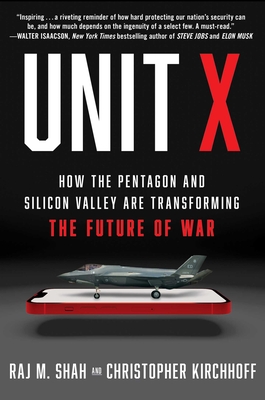
Shah, Raj M.
product information
description
8Shortlisted for the 2024 Financial Times Business Book of the Year A riveting inside look at an elite unit within the Pentagon--the Defense Innovation Unit, also known as Unit X--whose mission is to bring Silicon Valley's cutting-edge technology to America's military: from the two men who launched the unit. A vast and largely unseen transformation of how war is fought as profound as the invention of gunpowder or advent of the nuclear age is occurring. Flying cars that can land like helicopters, artificial intelligence-powered drones that can fly into buildings and map their interiors, microsatellites that can see through clouds and monitor rogue missile sites--all these and more are becoming part of America's DIU-fast-tracked arsenal. Until recently, the Pentagon was known for its uncomfortable relationship with Silicon Valley and for slow-moving processes that acted as a brake on innovation. Unit X was specifically designed as a bridge to Valley technologists that would accelerate bringing state of the art software and hardware to the battle space. Given authority to cut through red tape and function almost as a venture capital firm, Shah, Kirchhoff, and others in the Unit who came after were tasked particularly with meeting immediate military needs with technology from Valley startups rather than from so-called "primes"--behemoth companies like Lockheed, Raytheon, and Boeing. Taking us inside AI labs, drone workshops, and battle command centers--and, also, overseas to Ukraine's frontlines--Shah and Kirchhoff paint a fascinating picture of what it takes to stay dominant in a fast-changing and often precarious geopolitical landscape. In an era when America's chief rival, China, has ordered that all commercial firms within its borders make their research and technology available for military exploitation, strengthening the relationship between Washington and Silicon Valley was always advisable. Today, it is an urgent necessity.
member goods
No member items were found under this heading.
Return Policy
All sales are final
Shipping
No special shipping considerations available.
Shipping fees determined at checkout.







